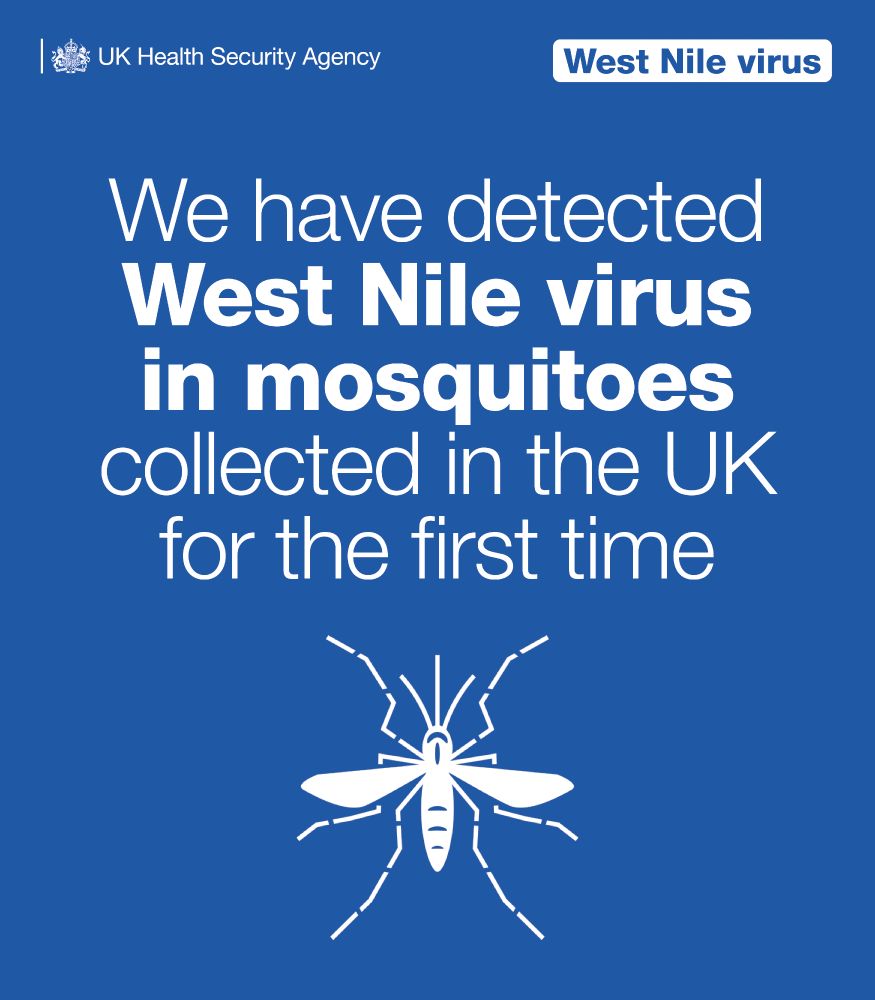Richard Hassall
@richardhassall.bsky.social
Ecological modeller interested in zoonotic diseases and invasive species.
Reposted by Richard Hassall
🆕 Today, UKHSA and the Animal and Plant Health Agency (APHA) have confirmed the first detection of West Nile virus in mosquitoes collected in the UK.
There is currently no evidence of wider circulation in birds or mosquitoes, and the risk to the public remains very low.
📰🔗 www.gov.uk/government/n...
There is currently no evidence of wider circulation in birds or mosquitoes, and the risk to the public remains very low.
📰🔗 www.gov.uk/government/n...

May 21, 2025 at 12:33 PM
🆕 Today, UKHSA and the Animal and Plant Health Agency (APHA) have confirmed the first detection of West Nile virus in mosquitoes collected in the UK.
There is currently no evidence of wider circulation in birds or mosquitoes, and the risk to the public remains very low.
📰🔗 www.gov.uk/government/n...
There is currently no evidence of wider circulation in birds or mosquitoes, and the risk to the public remains very low.
📰🔗 www.gov.uk/government/n...
Reposted by Richard Hassall
"The overlapping global distribution of dengue, chikungunya, Zika and yellow fever" now out with the WHO GAI team doi.org/10.1038/s414...

The overlapping global distribution of dengue, chikungunya, Zika and yellow fever - Nature Communications
Arboviruses transmitted by Aedes mosquitoes have an expanding global distribution and identifying areas at risk is important for public health planning. Here, the authors present global disease maps f...
doi.org
April 11, 2025 at 11:46 AM
"The overlapping global distribution of dengue, chikungunya, Zika and yellow fever" now out with the WHO GAI team doi.org/10.1038/s414...
Reposted by Richard Hassall
🧭 New #ECDC Maps Highlight Tick-Borne Encephalitis Risk Areas in Europe.
➡️ Our maps show the #TBE hotspots in the EU are mainly concentrated in Central, Eastern, & Northern Europe.
➡️ Some areas reported TBE for the 1st time, indicating possible geographical spread.
Read more: bit.ly/42p8XJT
➡️ Our maps show the #TBE hotspots in the EU are mainly concentrated in Central, Eastern, & Northern Europe.
➡️ Some areas reported TBE for the 1st time, indicating possible geographical spread.
Read more: bit.ly/42p8XJT

April 15, 2025 at 5:09 PM
🧭 New #ECDC Maps Highlight Tick-Borne Encephalitis Risk Areas in Europe.
➡️ Our maps show the #TBE hotspots in the EU are mainly concentrated in Central, Eastern, & Northern Europe.
➡️ Some areas reported TBE for the 1st time, indicating possible geographical spread.
Read more: bit.ly/42p8XJT
➡️ Our maps show the #TBE hotspots in the EU are mainly concentrated in Central, Eastern, & Northern Europe.
➡️ Some areas reported TBE for the 1st time, indicating possible geographical spread.
Read more: bit.ly/42p8XJT
Reposted by Richard Hassall
New GLiTRS paper out today!
NEW PAPER from the GLiTRS team! 🎉
We review how best to use different types of evidence to better understand global insect declines 🦗🪳🪲🦋🐛🐜
"Integrating multiple evidence streams to understand insect biodiversity change" published in @science.org
🔗 tinyurl.com/mr35bdaa
A summary 🧵 below (1/7)
We review how best to use different types of evidence to better understand global insect declines 🦗🪳🪲🦋🐛🐜
"Integrating multiple evidence streams to understand insect biodiversity change" published in @science.org
🔗 tinyurl.com/mr35bdaa
A summary 🧵 below (1/7)
www.science.org
April 4, 2025 at 1:04 PM
New GLiTRS paper out today!
Our new paper combines wildlife surveillance data and spatial risk modelling to map suitability for TBEV in GB. We identified key drivers linked to TBEV exposure in deer and produced risk maps, which can guide future surveillance and interventions. www.eurosurveillance.org/content/10.2...

Identifying hotspots and risk factors for tick-borne encephalitis virus emergence at its range margins to guide interventions, Great Britain
Background
Tick-borne encephalitis virus (TBEV) is expanding its range in Europe, with increasing human cases reported. Since the first detection of TBEV in ticks in the United Kingdom in 2019, one po...
www.eurosurveillance.org
April 3, 2025 at 5:15 PM
Our new paper combines wildlife surveillance data and spatial risk modelling to map suitability for TBEV in GB. We identified key drivers linked to TBEV exposure in deer and produced risk maps, which can guide future surveillance and interventions. www.eurosurveillance.org/content/10.2...
Reposted by Richard Hassall
Brilliant news on a Friday afternoon: gov will launch new natural history GCSE. It's taken Mary Colwell, @carolinelucas.bsky.social & others years of campaigning. (I'm praying it'll be introduced quickly enough for my children!)
www.theguardian.com/environment/...
www.theguardian.com/environment/...

Department for Education confirms launch of natural history GCSE
Campaigners have been calling for the qualification for years but plan stalled despite a curriculum being drawn up
www.theguardian.com
March 21, 2025 at 4:15 PM
Brilliant news on a Friday afternoon: gov will launch new natural history GCSE. It's taken Mary Colwell, @carolinelucas.bsky.social & others years of campaigning. (I'm praying it'll be introduced quickly enough for my children!)
www.theguardian.com/environment/...
www.theguardian.com/environment/...
Reposted by Richard Hassall
Interested in quantifying how surface water might affect water-borne and water-related infectious diseases in degraded tropical agro-forest landscapes? Optical remote sensing can miss small monsoon water-bodies where animal hosts, people and vectors hang out.... doi.org/10.1371/jour...

Radar versus optical: The impact of cloud cover when mapping seasonal surface water for health applications in monsoon-affected India
Surface water plays a vital role in the spread of infectious diseases. Information on the spatial and temporal dynamics of surface water availability is thus critical to understanding, monitoring and ...
doi.org
January 27, 2025 at 2:39 PM
Interested in quantifying how surface water might affect water-borne and water-related infectious diseases in degraded tropical agro-forest landscapes? Optical remote sensing can miss small monsoon water-bodies where animal hosts, people and vectors hang out.... doi.org/10.1371/jour...
Reposted by Richard Hassall
📢 New in @methodsinecoevol.bsky.social
A framework to predict zoonotic hosts under data uncertainty: a case study on betacoronaviruses
Tonelli&al: doi.org/10.1111/2041...
We predict unknown potential viral hosts to unveil unrecognised hotspots of betacoronaviruses: time to redefine surveillance?
A framework to predict zoonotic hosts under data uncertainty: a case study on betacoronaviruses
Tonelli&al: doi.org/10.1111/2041...
We predict unknown potential viral hosts to unveil unrecognised hotspots of betacoronaviruses: time to redefine surveillance?

January 24, 2025 at 9:21 AM
📢 New in @methodsinecoevol.bsky.social
A framework to predict zoonotic hosts under data uncertainty: a case study on betacoronaviruses
Tonelli&al: doi.org/10.1111/2041...
We predict unknown potential viral hosts to unveil unrecognised hotspots of betacoronaviruses: time to redefine surveillance?
A framework to predict zoonotic hosts under data uncertainty: a case study on betacoronaviruses
Tonelli&al: doi.org/10.1111/2041...
We predict unknown potential viral hosts to unveil unrecognised hotspots of betacoronaviruses: time to redefine surveillance?
Reposted by Richard Hassall
First field evidence that Kyasanur Forest Disease Virus can be transmitted from adult females to their eggs in both Haemaphysalis and Rhipicephalus ticks in India. Read more here: doi.org/10.1186/s130...

First evidence of transovarial transmission of Kyasanur Forest disease virus in Haemaphysalis and Rhipicephalus ticks in the wild - Parasites & Vectors
Background Kyasanur forest disease virus (KFDV) is a tick-borne flavivirus causing debilitating and potentially fatal disease in people in the Western Ghats region of India. The transmission cycle is ...
doi.org
January 17, 2025 at 2:11 PM
First field evidence that Kyasanur Forest Disease Virus can be transmitted from adult females to their eggs in both Haemaphysalis and Rhipicephalus ticks in India. Read more here: doi.org/10.1186/s130...
Reposted by Richard Hassall
New study on dengue importation dynamics in Africa combining passenger flight, suitability, and seasonal transmission dynamics.
Led by Jenicca Poongavanan and Houriiyah Tegally.
www.sciencedirect.com/science/arti...
Led by Jenicca Poongavanan and Houriiyah Tegally.
www.sciencedirect.com/science/arti...


December 12, 2024 at 2:55 AM
New study on dengue importation dynamics in Africa combining passenger flight, suitability, and seasonal transmission dynamics.
Led by Jenicca Poongavanan and Houriiyah Tegally.
www.sciencedirect.com/science/arti...
Led by Jenicca Poongavanan and Houriiyah Tegally.
www.sciencedirect.com/science/arti...
Reposted by Richard Hassall
Looking for a #PhDposition? Passionate about #pollinators and #citizenscience? Come do a PhD at @ukceh.bsky.social on developing indicators for pollinating insects using data from UK PoMS. The project includes a placement at JNCC. To apply tinyurl.com/3ve5szrh
@drnickisaac.bsky.social
@drnickisaac.bsky.social

CR2025_21: Developing metrics of change for pollinating insects in the UK at University of Reading on FindAPhD.com
PhD Project - CR2025_21: Developing metrics of change for pollinating insects in the UK at University of Reading, listed on FindAPhD.com
tinyurl.com
December 10, 2024 at 10:01 AM
Looking for a #PhDposition? Passionate about #pollinators and #citizenscience? Come do a PhD at @ukceh.bsky.social on developing indicators for pollinating insects using data from UK PoMS. The project includes a placement at JNCC. To apply tinyurl.com/3ve5szrh
@drnickisaac.bsky.social
@drnickisaac.bsky.social
Reposted by Richard Hassall
Read about the factors affecting cross-sectoral collaboration in zoonotic disease management in India in our new paper, by Dr Festus Asaaga and the IndiaZooRisk and IndiaZooSystems teams rdcu.be/d2akp @ukceh.bsky.social @ukri.org
Ties that bind: understanding One Health networks and participation for zoonoses prevention and control in India
rdcu.be
December 2, 2024 at 9:58 PM
Read about the factors affecting cross-sectoral collaboration in zoonotic disease management in India in our new paper, by Dr Festus Asaaga and the IndiaZooRisk and IndiaZooSystems teams rdcu.be/d2akp @ukceh.bsky.social @ukri.org
Our new paper in @jappliedecology.bsky.social used models informed by spread in invaded regions to assess the effectiveness of interventions targeting yellow-legged hornet (aka Asian hornet) at its invasion front in Europe. doi.org/10.1111/1365....

Predicting the spatio‐temporal dynamics of biological invasions: Have rapid responses in Europe limited the spread of the yellow‐legged hornet (Vespa velutina nigrithorax)?
By predicting the extent of a biological invasion in the absence of timely interventions and comparing this to the current distribution of the yellow-legged hornet, we found that management measures ...
doi.org
December 5, 2024 at 10:48 AM
Our new paper in @jappliedecology.bsky.social used models informed by spread in invaded regions to assess the effectiveness of interventions targeting yellow-legged hornet (aka Asian hornet) at its invasion front in Europe. doi.org/10.1111/1365....

